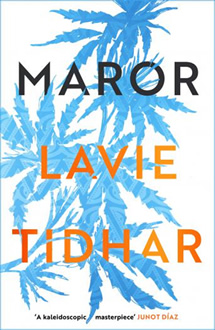Reviewed by Robert Goodman.
By Lavie Tidhar, Head of Zeus, $29.99.
 Science fiction and fantasy writer Lavie Tidhar turns to the very real history of Israel in his latest novel, Maror. This is not the first time Tidhar has used Israel as a setting for his work. But his award-winning Central Station is set around a Tel Aviv spaceport, and the multiversal Unholy Land imagines a state of Israel established in Uganda. Maror, by contrast, is based squarely on real events between 1976 and 2003. There are no speculative fiction bells and whistles here. Instead there is a peeling away of any veneer of respectability from the state’s founders and a glimpse of the underbelly of Israeli history.
Science fiction and fantasy writer Lavie Tidhar turns to the very real history of Israel in his latest novel, Maror. This is not the first time Tidhar has used Israel as a setting for his work. But his award-winning Central Station is set around a Tel Aviv spaceport, and the multiversal Unholy Land imagines a state of Israel established in Uganda. Maror, by contrast, is based squarely on real events between 1976 and 2003. There are no speculative fiction bells and whistles here. Instead there is a peeling away of any veneer of respectability from the state’s founders and a glimpse of the underbelly of Israeli history.
Maror is a noir view of that history in the vein of James Ellroy’s Underworld USA trilogy (American Tabloid, The Cold Six Thousand, Blood’s a Rover) in which the America of the 1950s and 60s was reinterpreted through the eyes of the corrupt. The opening section of Maror, set in Tel Aviv in 2003 and featuring drugged-out cop Avi smashing his way through an investigation into the attempted car-bomb murder of a mob boss, feels like it is riffing on the cops in Ellroy’s LA Quartet, right down to the stripped-back narrative:
Quiet was good. Quiet was what he needed. The pills really kicked in then. The electronic drum beat pounded in his head. The car still smouldering. Witnesses with bandages talking to police. Cameras flashed. He felt the journalists hush.
He followed their gaze.
Avi might be a policeman but he has been deeply enmeshed with organised crime from childhood, and investigates by seeking inside information from his connection, Benny:
Benny had a piece of almost everything in South Tel Aviv. Money change, protection, brothels, gambling, drugs. Even black market organ transplants, which was a real growth area. Grey market really, there was no real law against it. Plus he had legitimate businesses like shawarma and juice stands all over the place, the strip club on Allenby, and a lock on greengrocer stalls in the Carmel Market. Anything that dealt in cash and could be used to clean money that was dirty.
Following this twisted introduction, the narrative goes back to 1976 and from there proceeds chronologically through Israeli history. Benny’s rise from small-time hood to crime boss is chronicled, as is the rise of Eddie, an idealistic but corrupted police constable to commissioner, the vicissitudes of crusading journalist Sylvie, and Avi’s early years. As it progresses, the narrative takes in all of the key points of Israeli history – the first political win by the right-wing Likud party 30 years after the foundation of the State, the 1982 invasion of Lebanon, the training of drug cartels by ex-Israeli military, the assassination of Yitzhak Rabin. All of these events are recontextualised by Tidhar, who follows the money, the power and the corruption.
So that the lead-up to the election of the Begin government in the mid-1970s is the start of a land grab:
Sylvie thought of all that land. They were already building in the Sinai … In the Golan, too, they were building new kibbutzim behind the new demilitarised zone that the UN patrolled. But nothing in the West Bank, not yet
It was inevitable that settlement would happen here, it was inevitable all along. And the Jewish method from before independence was always two-fold: buy land when you could, occupy it when you couldn’t …
‘What you’re saying,’ Sylvie said, ‘is that some people are already speculating in land in the West Bank.’
‘For sure, yes.’
‘Betting that when the government does approve it – as the new people in power surely will – they can sell the lands back and make a killing?’
‘A killing,’ Sami said.
And the Lebanon War opened the opportunity for a drug pipeline so that in 1982, Benny has this reflection:
They’d crossed the border to bring order and stability to Lebanon, to end the reign of the PLO, to establish the Christian leader, Bachir Gemayel, as president, to have, as Begin promised them ‘forty years of peace’. They’d crossed the border for all those reasons and none of the above. Benny wasn’t sure exactly why … Maybe Lebanon was just a turf war that got out of control … He had no idea … He just wanted to buy a tonne or two of decent hashish.
So that by 1986 it has become:
The Israeli-Lebanese border: where the magic happened.
An entire machine oiled with ready cash and fuelled by greed and indifference.
No one gave a shit about this war. Not anymore.
While Maror is historical, it is more of a piece with Tidhar’s more recent works based on British mythology both in tone and structure. By Force Alone reinvents the Arthurian legend, presenting a king and his crew steeped in corruption and a lust for power. The Hood does something similar to the story of Robin Hood. Both By Force Alone and The Hood are structured similarly to Maror – a series of connected stories, told reasonably chronologically with the main actor of the piece often in the background. In Maror that character is Cohen, a corrupt policeman who is seemingly pulling the strings of much of the action. Cohen is the spirit of Tidhar’s version of Israel – a true believer, justifying everything he does as being for the good of the country, a man for whom the ends will always justify the means, whether that is fitting up a man with an intellectual disability as a murderer, or staging a car bomb for his own personal ends. Cohen is never the point of view character but he is always there, in the background, manoeuvring, manipulating and scheming.
In this context, even readers who are unaware of details of the tragic shooting of Yitzhak Rabin in 1995 can understand why the moderate centre could not hold; why, in the end, money and ideology would win out over a desire for peace.
Maror is the word for the bitter herbs eaten by Jews at Passover, recalling the bitterness of the years of slavery. But here it takes on another meaning, of the bitterness, the corruption, that lies behind the myth of the state of Israel. It is based on the idea that this state is no different to any other, driven by money and grifters, but ironically this is in some ways a success:
More and more they came. The thieves and the rapists, and didn’t Bialik write, or was it Ben Gurion, ‘We shall only have a true state when we have our own Hebrew thief, our own Hebrew whore, our own Hebrew murderer’? And so it came to be, Benny thought. So it came to be.
In some ways, therefore, this is not a repudiation of Israeli history but rather an acknowledgement that it is driven by many of the same forces that underpin the histories of other western democracies.
Maror is a profane, irreverent, scathing, sometimes blackly humorous and often compassionate fever-dream history of Israel. It feels like the novel that Tidhar, already an award-winner for his speculative fiction, has been building up to, the perfect storm of his own history and interest in the state of Israel but also his clear fascination with the striving for, and the machinations of, power. Confronting, illuminating and thought-provoking, Maror is possibly his best yet.
This review first appeared in Newtown Review of Books.
Over 850 more book reviews can be found on Pile by the Bed.









